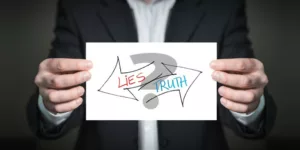I just finished two one-day trips from coast to coast. During those trips, I binged on Twitter news (I’m fascinated by how rapidly Musk is destroying both Twitter and his own reputation) and watched the first season of the Neil Gaiman series, The Sandman. I’ve been a fan of Gaiman ever since seeing the movie Stardust because his stories are thought-provoking and engaging and make me feel smarter by watching them.
In the fifth episode, titled “24/7”, Morpheus (who is The Sandman and the god of dreams) watches a human who feels the world would be better without lies and creates a reality where everyone says what they think in a diner. By the end of the episode, the people in the diner have killed each other or themselves. The moral or message of the episode is that lying is the dream people create for themselves, and without it, life isn’t worth living.
Now, The Sandman is fiction, but I wrote a postmortem on IBM’s near catastrophic failure in the 1990s and concluded that it was largely due to the lack of transparency. The people around the then CEO, John Akers, told him what he wanted to hear, not what he needed to know, resulting in catastrophic decisions that almost ended IBM a decade before reaching its 100-year anniversary.
So, is transparency good or bad? Let’s explore that this week.
Transparency: The good
As noted above, the problem operationally with IBM that almost caused its failure was the lack of transparency between the then CEO John Akers and the rest of the company. If he never saw the problems, then those problems didn’t upset him, but they also didn’t get fixed, meaning those problems multiplied to a level that almost killed the firm. For the first time in its history, they turned the IBM brand negative. For a time after that, people would pay less for an IBM-branded product, because they didn’t trust the company to be honest than they would any other brand (including a non-branded or “white-box” product).
I’d never seen a brand go from being one of the most valuable to one of the least valuable brands seemingly overnight, but it resulted from a lack of transparency both to the IBM leadership and to IBM’s customers. The saying “no one ever lost their jobs buying IBM” effectively reversed, and recovering from that took the better part of a decade.
Trust and honesty need to be foundational elements of both internal and external relations. Otherwise, people lose trust, bad decisions are made at an increasing rate due to misinformed managers, and, as IBM demonstrated, the firm is put at increased risk.
But people want to live the dream
As the IBM example also showcased, people often don’t want the truth. Take Elon Musk, who has positioned himself as the king of free speech. As I’m writing this, stories are breaking that he has banned the Twitter account that reported on his personal jet travel, and how he attacked his ex-security chief for speaking his mind and fired Space-X employees for suggesting he is doing more harm than good. Finally, reports out of both Twitter and SpaceX indicate he has surrounded himself, much like John Akers did, with people who tell him what he wants to hear, not what he needs to know (Twitter), or executive staff that has learned that telling him the truth is a career-killer (SpaceX).
I once sat at a table with some of the top salespeople for the company Giga Information Group that I was then working for. They were all very attractive women, and all were divorced because their husbands had cheated on them. These women were smart, funny, and over-the-top attractive, so I was dumbfounded that their husbands could even find someone they’d want to cheat with. Even more puzzling was that the women often didn’t figure out their husbands were cheating until years later. I concluded that the women wanted to live the dream and actively ignored or avoided information that indicated their husbands couldn’t be trusted (every one of these guys prided themselves on their conquests and their ability to manipulate women) and, as a result, had catastrophic relationship outcomes. And, what I also found fascinating was that until they came to terms with their husbands’ behavior, they were also surprisingly happy. In short, the truth not only didn’t set them free, it made them miserable.
This is problematic when we think of transparency. On the one hand, we need it to make good decisions (who really wants a cheating spouse?). On the other, like The Sandman episode, we want to live “the dream.” This means we are our own worst enemy when it comes to “transparency.”
We see this a lot in politics. When a politician is accused of misbehavior, our reaction often has more to do with whether they are in our party than it does the evidence. If they aren’t in our party, they must be guilty. If they are in our party, it’s a “witch hunt.” What we should be doing is reserving judgement until we see the evidence. But far too often we pass judgement and then exclude any evidence that suggests we are wrong. This is called “confirmation bias,” and it will be a huge problem with AIs if we don’t assure this doesn’t make it into AI programing.
But we need to accept that we both need transparency and don’t want it if we are to lead better lives.
Wrapping up: Elon Musk
Elon Musk is an interesting example of the nuances of transparency. Before buying Twitter, he was seen largely as a hero, a real-life Tony Stark (Ironman) superhero who could do no wrong. After Twitter, he is more often seen as a petty, incompetent leader who is disingenuous and really cruel to his employees (and animals). He hasn’t changed. Only our perceptions of him have changed, and while both are likely off the mark for who the guy really is, it is clear he is, like all of us, nuanced. Understanding that nuance can lead to better decisions when investing in him or buying his products (or avoiding them).
In short, we are surrounded by “fake news” as well as accurate news that people don’t like who brand it as “fake.” We need to think critically, but we also need “the dream” and to recognize that maybe there are things we don’t need to know to assure our happiness. The difficulty is telling the difference so that what we don’t want to know doesn’t come back to bite us in the butt. In my own case, while I was training to be an actor, I realized that being an actor would destroy my ability to enjoy movies and make my life less happy. I enjoyed the dream movies created, and there is no downside (that I’ve yet discovered) to that. So, while we should seek the truth about what is important, we should allow the dream where it is not. Figuring out how to do that dance is, in my view, the cornerstone of a happier life.








